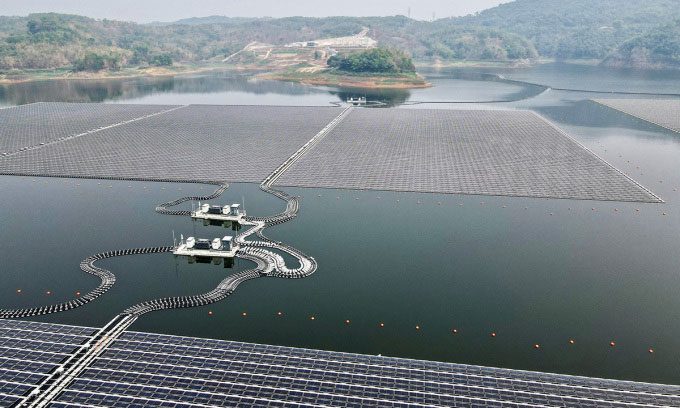On November 9, Indonesia inaugurated a $100 million floating solar farm, marking a significant milestone in the transition to green, renewable energy.
The newly inaugurated floating solar farm is named Cirata and is expected to produce enough electricity for 50,000 households. The facility is built on a 200-hectare lake in West Java, approximately 130 km from the capital city of Jakarta. “We have built the largest floating solar farm in Southeast Asia and the third largest in the world,” stated Indonesian President Joko Widodo.

The new floating solar power plant built on a lake in West Java. (Photo: Bay Ismoyo/AFP).
The project is a collaboration between Indonesia’s state electricity company Perusahaan Listrik Negara (PLN) and Abu Dhabi’s renewable energy company Masdar, completed in three years at a cost of approximately $100 million. Situated in a lush area surrounded by rice fields, the solar farm consists of around 340,000 solar panels.
With a maximum capacity of 192 MW, the farm is currently producing enough electricity to supply the Cirata region. According to Widodo, the project will be expanded to 500 MW, while PLN indicated that the final maximum capacity could reach up to 1,000 MW.
Indonesia is striving to achieve net-zero emissions by 2060. The country is also working towards achieving net-zero emissions in the electricity sector by 2050 in exchange for funding for the $20 billion Just Energy Transition Partnership (JETP) plan. Under this plan, Jakarta has committed to reducing carbon emissions in the electricity sector to a maximum of 250 million tons by 2030 (down from a previous cap of 290 million tons).
“We hope to see more renewable energy facilities built in Indonesia, such as solar, hydro, geothermal, and wind energy,” Widodo remarked. However, with solar and wind energy, each accounts for less than 1% of Indonesia’s electricity mix. The country still heavily relies on fossil fuels for electricity generation.
Indonesia aims to increase the share of renewable energy to 23% in its energy mix by 2025, but Widodo acknowledged that the country may not meet this target due to delays caused by Covid-19.
Indonesia has committed to halting the construction of new coal-fired power plants but continues to build those that were planned beforehand. The country is also striving to become a significant player in the electric vehicle market as the world’s largest producer of nickel, an essential component in lithium-ion batteries. However, some industrial zones with energy-intensive nickel smelters are still powered by coal.





















































